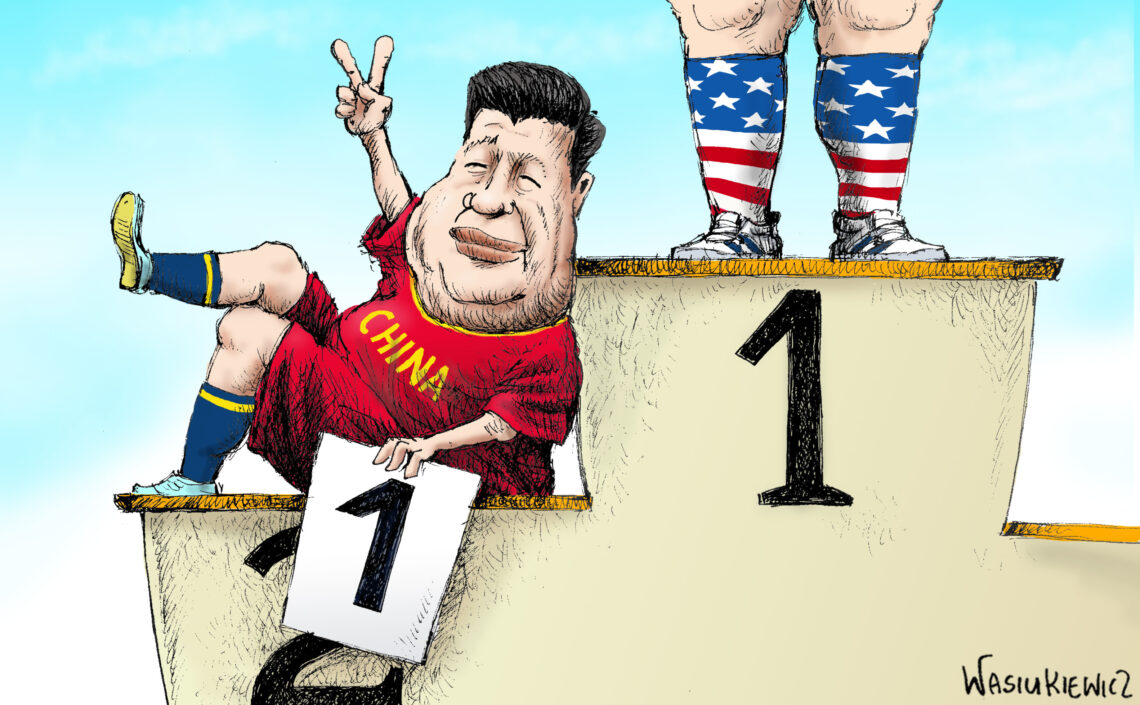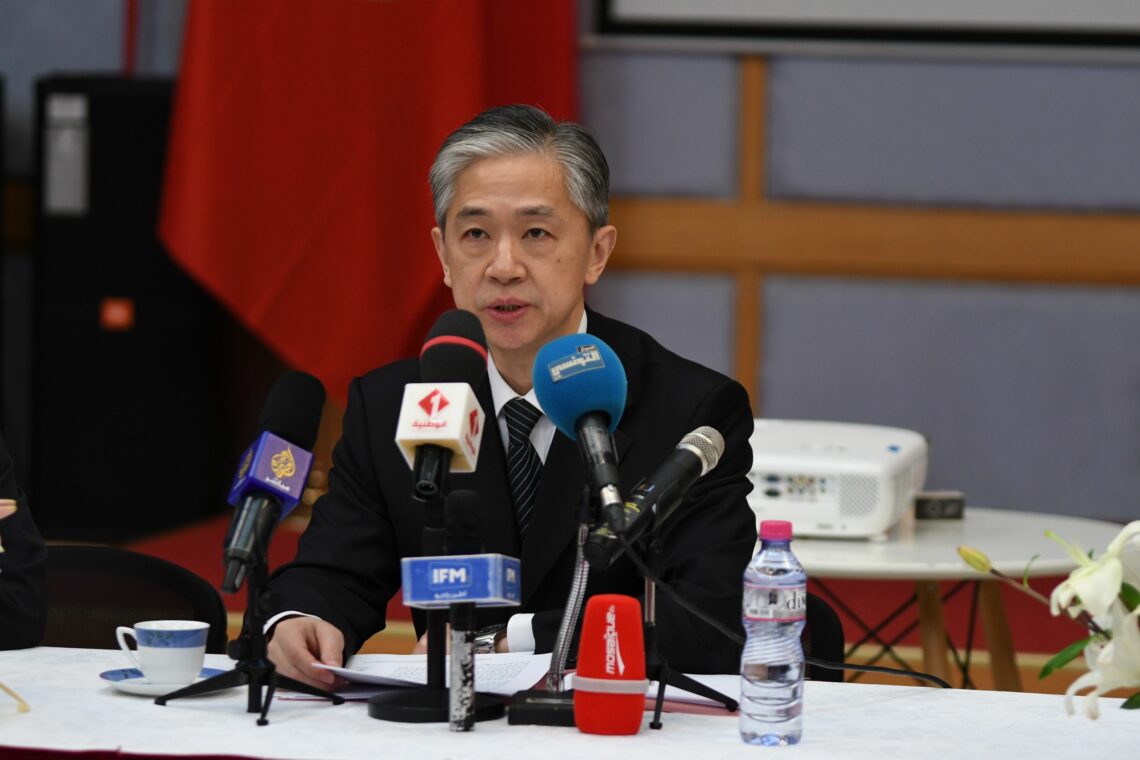The illusion of inevitable Chinese leadership
China’s new, more aggressive foreign policy has been dubbed “wolf warrior diplomacy,” after a Rambo-style movie popular in the country. But the adversarial stance could backfire – a more hostile West could scupper China’s dreams of dominance.

In a nutshell
- China has adopted a pugnacious new foreign policy
- The stance is based on faulty assumptions about its power
- The West’s pushback will hinge on technology competition
In recent years, China has adopted a new stance in its foreign policy: “wolf warrior diplomacy,” named after a Rambo-style movie popular in China. It eschews the country’s previous philosophy, encapsulated by former leader Deng Xiaoping’s call to “hide our capacities and bide our time.” Instead, Beijing is taking an adversarial posture toward the West.
The approach has become more pronounced since the outbreak of the Covid-19 pandemic. That is no accident. Beijing believes it is time to alter the world order more to its liking. Some Western countries retain hope that they can use pressure or dialogue to convince China to become a responsible stakeholder. The question is whether that is a fool’s errand.
Beidaihe meeting
Each summer, the Chinese Communist Party enters a critical phase in which it gears up to introduce new policies. Discussions on these issues are held at the Beidaihe meeting. Held in the resort town in Hebei province, party leaders and elders gather for informal, closed-door debates. Some China observers predicted that this year, a power struggle at the meeting would occur.
In particular, analysts expected dissatisfaction with President Xi Jinping’s wolf warrior diplomacy to set off the struggle. After all, the approach has greatly reduced China’s geopolitical room for maneuver. At the beginning of the year, China failed to deliver crucial information about the coronavirus (for example, that it can be transmitted between people) in a timely manner and tried to cover up the source of the outbreak. Later, Chinese Foreign Ministry Deputy Director Zhao Lijian blamed other countries for the crisis, infamously suggesting once that the United States military might have “brought the epidemic to Wuhan.”
The aggressive moves caused a backlash among Western countries and have increased distrust of China.
Then, China pressed countries it helped during the pandemic to be more ingratiating in return, hoping to make up for the poor image it had earned at the start of the outbreak. Finally, at the end of June, China introduced the Hong Kong security law, which greatly curtailed the city’s freedom. All these moves caused a backlash among Western countries and have increased distrust of China and its leadership.
In the face of such circumstances, some Chinese observers speculated that at this year’s Beidaihe meeting, Communist Party veterans would express their dissatisfaction with President Xi, and even move to replace him. But in his eight years at the helm of the country, Mr. Xi has gained plenty of experience beating back challenges to his power. After the conclusion of the summit, it was clear that he had easily dealt with the elders’ qualms.
President Xi will therefore not change his overarching strategy – though he will make it more sophisticated. The new details of his plan will be announced at the party’s plenary session in October this year, and will comprise two parts: the country’s 14th Five-Year Plan and his 2035 Goals, which reflect his Chinese Dream concept.
Putting emphasis on the 2035 Goals will help President Xi hold on to power in the long term. He will be 82 years old in 2035 – the same age as Mao Zedong when he died. Xi Jinping is like Mao in many ways, but he is more ambitious: he wants to turn China into a country that Western democracies fear.
Assumptions and complacency
With this in mind, it is important to remember that wolf warrior diplomacy was not implemented on a sudden whim – it was based on a set of long-held assumptions about China itself and the geopolitical environment. Though these ideas may seem reasonable at first blush, closer inspection reveals that they are either misplaced or exaggerated.
One such assumption is that China will inevitably surpass the U.S. in economic power within the next 10 years. From the Chinese point of view, this is partly already a reality. Though China’s gross domestic product (GDP) is nominally about 30 percent less than that of the U.S., China’s GDP is larger when measured by purchasing power parity. Based on a mixture of wishful thinking and half-truths, Beijing thinks it will automatically assume Washington’s leading role in global affairs.

Most political and academic circles in China consider such a development inevitable. Yet they have generally ignored that their country’s rise is at least partly due to the benign approach that the West has long taken toward it. In recent decades, this posture reflected a hope that China would change – that as its economy opened up to the rest of the world, its political system would grow closer to a liberal democracy.
It was this tolerance that made it possible for China to buy, steal and adopt Western technology. Now that the West has become wary of China’s strategy, the inevitability of Chinese leadership has become far less certain.
The second assumption is that China will remain the world’s largest factory, keeping international capital and Western industries reliant on the Middle Kingdom. Accordingly, Chinese leaders are convinced that the fate of the world economy is in their hands.
According to a recent survey conducted by China’s Ministry of Commerce, 99 percent of foreign-funded enterprises indicated that they would continue to invest and operate in China. Yet at the same time, Commerce Minister Zhong Shan recently admitted that pressure from industrial relocation is increasing. It is certainly true that some countries like Germany, with its automobile industry, are extremely dependent on the Chinese market. More than 85 percent of Germany’s market is outside the European Union, and China has been its largest trading partner for the past four years. Chinese officials believe that Western capital is on China’s side, even if Western governments have become less China-friendly.
But China has ignored that many countries, such as Vietnam and India, are also on the rise. Developed countries like the U.S. and Japan have also begun to reconsider where they locate manufacturing. “Decoupling,” if not yet fully realized, is taking place.
Technology and punishment
The third idea is that Chinese technology has already surpassed the West’s in some key areas, and in others, it is on par with Western counterparts. Here, too, Chinese policymakers are overconfident: they forget that the country’s leapfrog development is also based on the West having tolerated China’s nonmarket practices. Today, due to a lack of political trust, Chinese companies such as Huawei face huge roadblocks to their ambitions for conquering the global market. The good old days of outpacing others by taking technological shortcuts are over.
Chinese leaders’ fourth mistaken assumption is that they can use economic and various other means to punish “disobedient” countries at will. In the past, China punished smaller, developing-world countries. As a result, some developed Western countries worry about retaliation from Beijing.
China has punished smaller, developing-world countries. Now some developed Western countries worry about retaliation.
Australia is a typical case. When Covid-19 became a worldwide crisis, Australia (along with many other countries) called for an independent investigation into the source of the virus. China’s leadership decided to make an example out of Canberra. In May of this year, Beijing imposed an 80 percent tariff on Australian barley. China has also suspended some Australian beef imports. Parallel to that, the government warned students and tourists not to visit Australia, calling it a “racist” country.
Germany, for its part, is worried that China will punish its auto industry for its policies on Huawei. China’s use of economic retaliation, it seems, has become the new normal. Nevertheless, Chinese authorities are ignoring that such punitive measures inevitably lead to a loss of moral standing and international support.
The above-mentioned perceptions are deeply entrenched among Chinese policymakers. And they lie at the heart of China’s wolf warrior diplomacy. It is hard to imagine that Chinese leadership will accept any major change to these assumptions. China’s internal corrective mechanisms could cause a shift in the wolf warrior diplomacy – if they worked properly. But there are many signs that they do not.
For example, the cult of personality that was so prevalent under Mao is making a comeback. In July, China’s Foreign Ministry established a high-profile Xi Jinping Thought on Diplomacy research center, in honor of Xi Jinping’s “epoch-making” diplomatic philosophy. Foreign Minister Wang Yi called Xi Jinping “a great strategist.” Such fawning praise goes together with an intensification of repression at home. Ren Zhiqiang, a prominent real estate tycoon, ventured to make a series of critical comments referring to Mr. Xi as China’s “emperor without clothes.” The president was furious. Mr. Ren was expelled from the Communist Party and is set to spend the rest of his life in prison.
Protracted competition
China’s wolf warrior diplomacy is not only an issue of foreign policy; it is also linked to official perceptions of developments in various fields, especially economics, technology, and the military. To a certain extent, the assertive, hardline approach is a manifestation of China’s overestimation of its achievements and abilities.
Having experienced a series of setbacks, China has made some cosmetic adjustments to its strategy. For example, it has reduced the number of appearances by Mr. Zhao, who is considered more assertive and aggressive, while more frequently bringing out its new “gentle” face, Foreign Ministry spokesperson Wang Wenbin.
Even if Beijing and Washington were to sit down to talk, there would be nothing to say.
In an apparent effort to smooth over recent differences, Yang Jiechi – head of China’s Central Foreign Affairs Commission and a former ambassador to the United States – recently declared that his country and the U.S. “can talk about anything.” Yet even if Beijing and Washington were to sit down to talk, there would be nothing to say. China is not ready to make the political and economic reforms that the West expects.
Moreover, President Xi will not give up any ground he has already won on issues he perceives as China’s “core interests.” These include depriving Hong Kong of the freedom it has enjoyed and strengthening China’s presence in disputed areas such as the South China Sea.
Whether Western countries will be able to combat China’s new advance depends in the short run on their economies’ ability to recover quickly from the pandemic and to reinforce the democratic alliances that have held sway over the global order since World War II.
In the long run, the success of the West’s pushback against China will also depend on competition in several key areas, the most important of which is technology. It is true that Huawei is currently two to five years ahead of its Western counterparts in terms of 5G networks. But the technology race is a marathon. Huawei may not maintain its leadership position. Western democracies have enormous capacity for innovation and could humble Xi Jinping’s Communist Party if they can harness it to build technology superior to China’s. That job cannot be done overnight.
U.S. Secretary of State Mike Pompeo was right when he said recently that China’s economic clout makes it a tougher challenge for the West than the Soviet Union was. The outcome of this struggle will determine the future of all the nations on the globe. Without more sophisticated strategies, consistent technological superiority and a united front of democracies, it is a competition the West cannot win.







